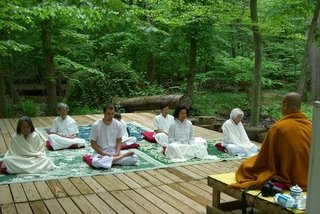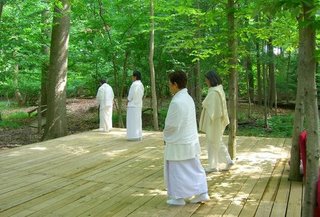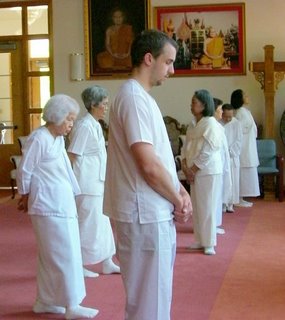
Meditation focuses on maintaining quietness of our busy mind. The effect is to direct our concentration to one healing element – one sound, one word, one image, or one's breath. When our mind is "filled" with the feeling of calm and peace, it cannot take off on its own and worry, stress out or get depressed.
The meditative state allows our nerves and tired muscles to relax, calm heart rates and ease blood pressure. The effect is so restful and peaceful that you will look forward to do it daily.
How Does Meditation Work?
Studies have shown that meditation can bring about a healthy state of relaxation by causing a generalized reduction in multiple physiological and biochemical markers, such as deceased heart rate, decreased respiration rate, decreased plasma cortisol, decreased pulse rate and increased EEG alpha, a brain wave associated with relaxation. Our body gains a state of profound rest.
During meditation, our blood pressure stays at "low level" but falls significantly for persons on medication with abnormally high levels of blood pressure.
Meditation reduces activity in the nervous system. Through meditation we can learn to access the relaxation response and to be aware of the mind and the way our attitudes produce stress. In calming the mind, meditation can also put one in touch with the inner physician, allowing our body's own inner wisdom to be heard.
Meditation is part of my yoga practice. When I meditate, I feel my life changes for the better. It brings me peace of mind and I handle things better in life. I have the insights I want to solve problems and a clearer viewpoint even when I feel stressful. Through all these years of practicing meditation, I have been able to reap the positive influence on my life.
How To Meditate Effectively?
Ideally you should meditate in a quiet place, or a room with no distraction. Wear simple and comfortable clothes and remove your shoes when meditate. Try meditating in the same place every time because that will build up a calm meditative energy, making it easier each time to go within.
Guide to Meditation:-
1. Sit upright on your meditation mat with legs folded. You may find this rather uncomfortable at the start, but after a few attempts you will get use to it.
2. Straighten up your spine and close your eyes.
3. Using both your thumb and forefinger touching each other, place your hands on your knees, one on top of the other.
4. Take three full breaths through your nose, filling up your lower diaphragm and slowly letting it out, again through the nose.
5. Repeat your breath, always through the nose, feeling your breath go in and go out.
6. Feel your breath enter your body and where it goes inside, then feel it go out of your body again.
7. If your are distracted by a thought, gently bring back your mind to your breathing and start once more to feel the breathing, then the exhaling.
I personally feel that the best time for meditation is the quiet early morning hours – between 6 A.M. to 6.30 A.M. However some people may prefer to meditate in the evening before they go to bed. The choice is yours, as long as you find it comfortable and effective.
It takes an experienced person to explain the wonderful, positive effects of meditation. For me, I want to share with you that meditation has improved my life tremendously over the years. If you think of meditating, ten or fifteen minutes a day for a start can have a powerful effect on you. You will realize how smoothly your day flows and how it transforms you over a period of time.
To improve your meditation atmosphere, you may light incense or a candle. Incense creates a sensory memory that helps draw you inside. You may also sit on a small woolen mat that is only used for meditation and this helps to hold energy.
If you like to light incense for your meditation, here are some facts; some scents encourage calm, while others promote vitality and energy. Sandalwood and frankincense soothe us and pull us inward. Tibetan monks use them for meditating, and also for religious ceremonies. Rosewood, geranium, and lavender calm our fears and ease our anxieties.
Citrus scents like orange, lemon and lime can provide stimulation after meditating. For a quick effect, place a few drops of orange blossom oil on a cotton ball and inhale. Peppermint and spearmint can be stimulating too.
Take the first step to meditate today for better health and younger you!
Dr.Ven. Thanat Inthisan
Wat Thai, Washington D.C.













